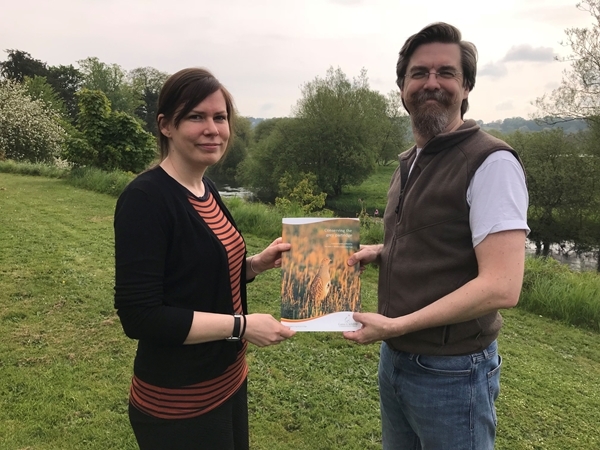
New Partridge Count Scheme co-ordinator Natalie Harvey with Neville Kingdon
THE newly-appointed co-ordinator of the Partridge Count Scheme (PCS) is calling on farmers, gamekeepers and land managers to return their spring counts before it’s too late.
Natalie Harvey, who has taken over from Neville Kingdon, is in charge of collecting information on the annual abundance and breeding success of the wild grey partridge.
“I would strongly encourage those involved to take part in counting their pairs while there is still time this spring,” said Natalie, who has joined the Game & Wildlife Conservation Trust (GWCT) after completing a Masters in Biodiversity Conservation.
“For most people, counting should take just a few hours around dawn or dusk while birds are out of cover and feeding.
“Last year was a good breeding year overall and it was a relatively mild winter, so we are hoping that counters will see good numbers of partridge pairs. It is also just as important to let us know when you haven’t seen any partridges.”
For those taking part, PCS feedback and site-specific results for their land can help identify what might be limiting their partridges.
This can help inform decisions on habitat management provision that would benefit grey partridges and other wildlife.
Counting partridges quantifies what birds are on the ground, with successful measures being reflected in subsequent counts, encouraging landowners and managers to continue and increase their efforts.
The PCS is a free and voluntary scheme that began in 1933. With ongoing declines in wild partridge numbers, in recent years the GWCT formed 15 regional partridge groups to provide focus on the plight of the grey partridge and offer solutions to their recovery.
Across the country these groups offer events and farm walks to provide updates on the partridge counts, our wider partridge research and face-to-face advice on how to manage land effectively to encourage wild partridges.
Natalie added: “The PCS is not just for people that shoot partridges. The presence of grey partridge is a great barometer of wider farmland biodiversity, and where they are doing well due to successful management, so will many other species.
“Grey partridges are quick to decline when things aren’t going well, and so counts can be an early warning system for those who are in the position to make changes.
“I would like to appeal to others to get involved with the PCS, as counts can be a useful tool for identifying what management could help on their land.”
Natalie’s predecessor Neville Kingdon, who organised the count for the past 14 years, is now leading a GWCT-mapping study quantifying the impacts of activities directed towards released game on other wildlife and their habitats.
For those wanting more information, or interested in joining, please go to www.gwct.org.uk/partridge
Notes to editors
The Game & Wildlife Conservation Trust – providing research-led conservation for a thriving countryside. The GWCT is an independent wildlife conservation charity which has carried out scientific research into Britain’s game and wildlife since the 1930s. We advise farmers and landowners on improving wildlife habitats. We employ 22 post-doctoral scientists and 50 other research staff with expertise in areas such as birds, insects, mammals, farming, fish and statistics. We undertake our own research as well as projects funded by contract and grant-aid from Government and private bodies. The Trust is also responsible for a number of Government Biodiversity Action Plan species and is lead partner for grey partridge and joint lead partner for brown hare and black grouse.
For information, contact:
Eleanor Williams
Telephone: 07592 025476
Email: press@gwct.org.uk